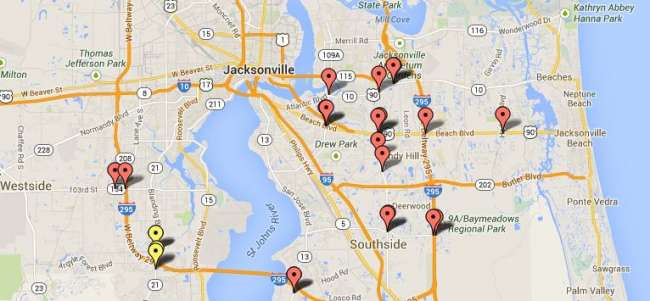Bidder on Miami-Dade County Red Light Camera RFP accused of bribing officials in several states, including Florida
Posted by Admin on Jan 30, 2014 | 0 commentsThe company overseeing Jacksonville’s red-light cameras has been accused by one of its former executives of giving “gifts and bribes” to government officials in 13 states, including Florida.
RedFlex Traffic Systems, the Arizona-based firm that installed and monitors cameras at 25 intersections in Jacksonville, has been mired in controversy surrounding a $100 million contract it had with the city of Chicago, which has since fired the company. Company officials admitted last year that the contract, one of the largest in the country, was likely the result of a $2 million bribery scheme involving a former Chicago city official who oversaw the red-light camera program, according to the Chicago Tribune.

BY THE NUMBERS: Where most red-light violations occur
Now, Aaron Rosenberg, RedFlex’s former top salesman who was fired and sued by the company in the wake of the scandal, has shot back at the company with a counter lawsuit, alleging the company routinely gave gifts and bribes to government officials in attempt to steer contracts. The lawsuit did not elaborate on the bribery accusations, and nobody involved in the controversy has been charged with a crime. Rosenberg’s lawyer has said his client is cooperating with a federal investigation, according to the Chicago Tribune.
MAP: Where the red light cameras are
RedFlex denied Rosenberg’s allegations in a written statement Thursday and vowed to “aggressively defend itself.”
Rosenberg’s lawsuit also mentioned how RedFlex courted Florida government officials with a steak house dinner in Jacksonville. RedFlex invited about 15 council members and their spouses from around the state, including Jacksonville, to dinner at Morton’s Steakhouse in August 2006, according to a series of e-mails included in the countersuit. The dinner cost $3,230.
RELATED: See our traffic page for the latest road conditions, construction and traffic cams
The e-mails do not include the names of who attended the dinner, so it’s not clear if anyone from Jacksonville accepted the invitation. But RedFlex employees discussed in the e-mails how the dinner helped gain the attention of the Jacksonville’s Sheriff’s Office, which would years later pick RedFlex to administer its red-light camera program.
In one e-mail, a RedFlex employee said a meeting with “Jacksonville police and engineering which resulted in the request of a proposal” was a “direct result of the function.” A follow-up breakfast was also scheduled with the “Jacksonville Sheriff, Engineering and County administrator” in December 2006, according to the e-mails.
There isn’t a county administrator position.
Sheriff’s Office spokeswoman Lauri-Ellen Smith said Tuesday in a written statement that Sheriff John Rutherford didn’t recall attending any dinners or breakfast meetings with RedFlex, as mentioned in the lawsuit. Smith also denied that a request for proposal was issued as a result of meetings with RedFlex in 2006.
“The actual award of the contract did not occur until five years later, in 2011, and was the result of a full and open RFP [request for proposal], conforming precisely to the requirements of Florida law and the City of Jacksonville procurement code,” Smith said in her statement.
The city’s interest in red-light cameras dates back to 2007, when the City Council passed a law calling for their installation. However, Florida law did not allow red-light cameras, and the city held off implementing the cameras until the state Legislature passed a law allowing them in 2010.
The city of Jacksonville, along with two companies that unsuccessfully competed for the city’s red-light camera contract, hired lobbyists while lawmakers considered the bill, state records show. American Traffic Systems began lobbying the legislature in 2007, and Xerox Inc., which owns a red-light camera subsidiary company, hired a lobbyist in 2010. One of American Traffic Systems’ lobbyists, Southern Strategy Group, also lobbied for the city of Jacksonville.
RedFlex also hired a lobbyist, but it wasn’t until July 2010, a few months after the governor signed the law allowing red light cameras. That lobbying firm, Tidewater Consulting, was also lobbying at the time for the Jacksonville Sheriff’s Office. Edward Blakely, who was employed by Tidewater at the time, has served as Sheriff John Rutherford’s campaign manager.
Rutherford was an early advocate of the red-light camera program, and the Sheriff’s Office had an instrumental role in choosing which company received the contract.
Blakely did not return phone messages seeking comment.
Council president Bill Gulliford said he would have liked to have known the two entities employed the same lobbyist when he approved the red-light camera contract. He said he doesn’t think the information would have changed the way he voted, but it may have led him or other council members to ask more questions.
“In this day and time, I think, frankly, you should go overboard in the other way as to not give any inkling or picture of anything that could remotely be called impropriety,” Gulliford said.
RedFlex ultimately won a $7.7 million contract with the city and has installed cameras at 25 intersections since 2012. The company will install four more cameras by the end of this month.



